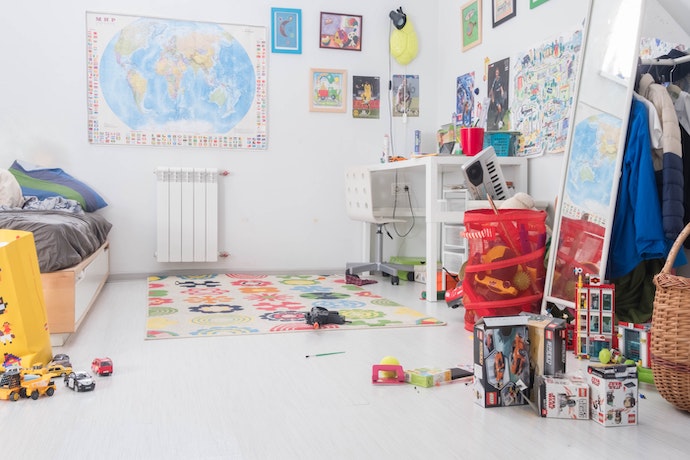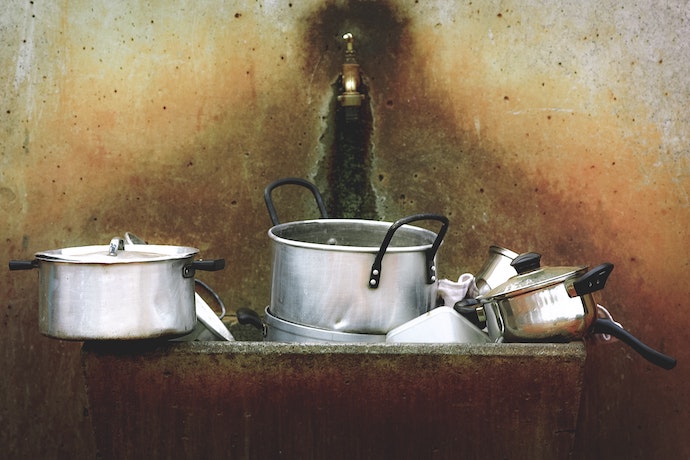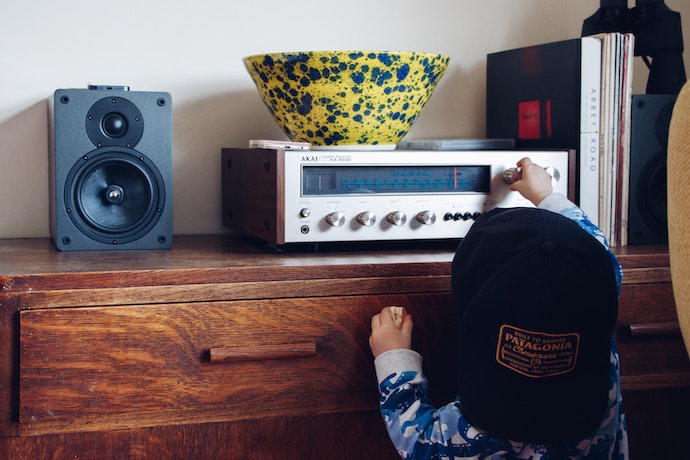In this article, we'll look at some tips for encouraging kids to get involved with household chores, making it a more pleasant experience for all involved and NOT a parenting nightmare !
Why Helping with Household Chores is Important
It's important to teach children early on that helping with household chores is part of being a responsible family member. Not only does it help keep the house clean and organized, but it also teaches kids important values such as cooperation and responsibility, as well as teaching them about the importance of taking care of their home , their belongings and establishing positive routines.

Photo by Igor Starkov on Unsplash
Be Clear About the Expectations
It's important to be clear about what is expected from the children when it comes to helping with household chores. Make sure to set specific rules and expectations, and make sure the children understand them. It can also be helpful to provide a list of tasks that they are expected to complete each day.
Make it Fun
No one wants to do something that feels like a chore, so make sure to make it fun! Have everyone pitch in to make it more enjoyable, such as having a family music night while cleaning. You can also make up games or give rewards for completing the tasks.
Show Appreciation
It's important to show appreciation for the hard work of the children. A simple “thank you” or a reward or allowance can go a long way in motivating your kids to keep helping with household chores.
By following these tips, you can help make household chores a more pleasant experience for everyone in the family, and teach your kids important values and skills at the same time. So don't be afraid to get your kids involved in helping out around the house!
Setting Up a System
Getting kids involved in household chores can be an effective way to teach them responsibility and help around the house. It can also be a great way for family members to bond and spend quality time together. But how do you get your kids to embrace the idea of helping out? Here are some tips to consider when creating a chore chart for your little ones:
• Break down the chores into age-appropriate tasks. Young children should be able to handle basic tasks like tidying up their room or putting away toys, while older kids can take on more difficult tasks such as dusting or doing the dishes.
• Be sure to provide clear instructions to your children. This will help them understand what is expected of them and make the chore easier for them to complete.
• Make sure to reward your children for their hard work. This could be something as simple as a few words of praise or a small treat.
• Involve your children in the process. Ask them for suggestions on how to make the chore chart more fun and interesting.
• Set a routine for completing the chores. This will help to ensure that everyone in the family is on the same page about when the chores need to be completed.
• Have patience! It may take some time for your children to adjust to the idea of doing chores, but with a bit of practice and consistency, they’ll soon be pros!
• Creating a chore chart. This can be a great way to get your kids involved in helping out around the house. It can also be a fun and educational experience for the whole family. With a bit of patience and understanding, you can help your children develop important values and skills while spending quality time together. So go ahead and start creating that chore chart today!

Photo by No Revisions on Unsplash
Subdividing Tasks
Break down larger tasks into smaller, more manageable chunks. This can help keep your child from becoming overwhelmed and make it easier for them to complete the task. For example, instead of asking your child to clean the whole bedroom, you can ask them to make their bed, clean their desk, and put away their clothes. Breaking tasks down into smaller chunks can help your child better understand what is expected of them and make it easier to manage the task.
Let Them Choose
Let your kids pick the chores that they want to help with and make sure they understand why they’re important. This will give them a sense of control and make them proud to be doing something to help out.
Encourage Your Child
Encourage your child to take ownership of their tasks and be proud of the work they are doing. This will help them to become more responsible and motivated about doing their chores. You can do this by providing positive reinforcement and praising them for their hard work.
Offering Rewards
When it comes to getting kids to help with chores, you may be wondering what’s the best approach: offering rewards for completing tasks, or teaching them about responsibility? The answer isn’t always clear-cut – it really depends on your child’s age and personality.If your child is younger, you mFAQ

Photo by Patricia Prudente on Unsplash
What strategies can I use to get my kids to clean up after themselves?
Having your kids clean up after themselves can be a challenge, but there are some strategies you can use to help. One of the most effective strategies is to create a system of rewards and consequences. Set up a chart with tasks they need to complete and rewards they can earn after they complete each task. This gives them a clear set of expectations, and they'll feel motivated to complete their tasks if they know they'll get a reward after. Another thing you can do is set a timer. Give them a set amount of time to clean up, and if they don't finish in the allotted time, there should be a consequence, like having to lose a privilege. Lastly, try to make clean up more interesting for them. Put on some music and make it into a game. The key is to make sure they're held accountable, while also finding ways to make the task more enjoyable.

Photo by JESHOOTS.COM on Unsplash
What are some good ways to motivate my kids to do chores?
Motivating kids to do chores can be a challenge, but it's an important part of teaching them responsibility. Here are a few ways to help you get started:
1. Make a rewards system. Let your kids know that they can earn rewards for completing their chores, like extra screen time or a special snack.
2. Create a chore chart. Give your kids a visual reminder of their responsibilities by having them put their names next to the chores they are responsible for.
3. Break it down. Break down larger chores into smaller tasks so that it doesn't seem so daunting for your kids.
4. Involve them in the process. Ask your kids for feedback on how to make chores more fun.
5. Praise their efforts. Make sure to recognize and praise your kids when they do their chores without prompting.
By using these strategies, you can help motivate your kids to do their chores and teach them valuable life lessons at the same time!
What can I do to make sure my kids stay on top of their chores?
Having a chore list is a great way to make sure your kids stay on top of their chores. Make sure to include specific tasks that need to be completed, when they need to be done, and the consequences if the chore isn't completed. You could also assign rewards when they complete their tasks on time and encourage them to stay motivated. Additionally, it helps to have a regular time each day (or week) when you do chores together as a family. Setting a schedule and sticking to it can help kids stay on track.
How can I teach my kids to take responsibility for their tasks?
Teaching kids to take responsibility for their tasks can be challenging, but it's an important part of developing a strong work ethic. Here are a few tips to help your kids take responsibility for their tasks:
1. Make sure the task is understood. When assigning a task, be sure to explain exactly what needs to be done, how it needs to be done, and when it should be completed. This helps to avoid any confusion or misunderstandings.
2. Set clear expectations. Let your kids know what is expected of them. Make sure they understand the importance of taking responsibility for their tasks and the consequences if they fail to do so.
3. Lead by example. Show your kids what it looks like to take responsibility by demonstrating it yourself. Model taking responsibility and your kids will follow suit.
4. Provide support. Offer guidance and support when needed, but also allow them to figure out how to do things on their own. This will help your kids become more confident and independent.
5. Celebrate success. Praise your kids when they take responsibility and complete their tasks. This will reinforce the importance of taking responsibility and will motivate them to keep doing it.

Photo by Jewel Mitchell on Unsplash
How can I make sure my kids are completing their assigned tasks?
Making sure your kids are completing their assigned tasks can be a challenge, but there are a few things you can do to help keep them on track. First, create a schedule for them and outline exactly what tasks need to be completed and when. Additionally, break tasks down into more manageable chunks and provide regular feedback and support to help them stay on track. Lastly, set clear expectations on when their tasks need to be completed by, and consider providing a reward system for tasks that are completed on time.
How can I get my kids to take ownership of their tasks?
Getting kids to take ownership of their tasks is an important part of helping them develop into responsible adults. It's all about setting a good example and making sure they understand why it’s important to take ownership and how it helps them grow.
One way to get them to take ownership is to make sure they understand the value of their tasks. Talk to them about how what they’re doing is important, and explain how completing their tasks can help them reach their goals.
Another way is to make sure the tasks are appropriate for their age and level of understanding. Give them tasks that are achievable, but still challenge them to think and problem-solve.
Finally, reward them for their effort. Praise them for a job well done and offer incentives, such as allowance or extra time with friends, when they complete their tasks. This will help give them a sense of pride and accomplishment, and encourage them to take ownership of their tasks in the future.

Photo by Scott Umstattd on Unsplash
What rewards can I give my kids for completing their chores?
If you're looking for rewards for your kids for completing their chores, there are plenty of options! Some of the most popular rewards include extra screen time, special privileges like going out for ice cream, or fun activities like a game night. Whatever you choose, make sure it's something your child will enjoy. You can also offer small rewards for completing each task, like a sticker chart or a piece of candy. Remember to be consistent with your rewards and keep things positive – that way your kids will be more likely to keep doing their chores!
If your child is younger, you may find that offering rewards (like stickers, a special treat, or extra allowance) works well in the short-term. This approach helps to motivate kids to get the job done, while also making it more fun!
For older kids, the focus should shift from rewards to teaching responsibility. This means spending time with them discussing why household chores are important, and helping them understand their role in the family.
Be Patient
Don't expect your kids to be able to do difficult tasks right away. Start slow and have patience with them as they learn. If they make a mistake, don’t be too hard on them. Explain why it isn’t the right way to do the chore and show them the proper way.

Photo by Aron Visuals on Unsplash
Make Chores Fun
Make chores fun and engaging for your child by creating a game out of it. For example, you can have a race to see who can complete their tasks the fastest or create a point system where they can earn rewards for completing their tasks.
Getting your kids involved in household chores is a great way for them to learn responsibility and help out around the house. With some patience and creativity, you can help your children feel motivated and excited about doing their chores. So what are you waiting for? Get your kids involved in helping out today!
Use Music
Household chores can be a drag, especially for kids. A great way to encourage them to help is to make it fun. Put on some upbeat music and make a game out of the task! Have everyone dance and clean simultaneously, or create a challenge to see who can finish their chore the fastest. Music makes it more enjoyable, and can take the focus off of the task at hand.

Photo by Will Francis on Unsplash
Make it a Game
Whenever possible, turn chores into a game with the kids. Play music and dance around while cleaning, use a stopwatch to time how fast they can put away their toys, create a scavenger hunt to help them find things to put away, or have races to see who can fold a certain amount of laundry the fastest. Not only will this make them more willing to help, but it’ll also teach them important skills like time management and organization.
Dealing with Resistance
A. Be Patient
Some kids may be more resistant to helping out. Don’t be too hard on them. Talk with them calmly and explain why it’s important to help with household chores.
B. Negotiate | Try negotiating with them.
Give them the choice of what chore they would like to do or suggest splitting the task into smaller chunks.
C. Set an Example |Lead by example.
Make sure you’re willing to put in the effort and help out with chores. Show them that it’s important and that everyone needs to contribute.
In conclusion, getting kids involved in household chores can be a great way to teach them responsibility, organization, and time management. Start out small by setting clear expectations, being patient, and making it fun. Negotiate with them if needed and lead by example. With these tips, you’ll be able to encourage your kids to help out more around the house.

Photo by Maria Lysenko on Unsplash
Benefits of a Household That Works Together
Getting kids involved in chores around the house can be a challenge, but it doesn't have to be. There are many benefits to encouraging kids to participate in household chores. Not only will they develop valuable life skills and a sense of responsibility, but they will also learn the value of teamwork. As a bonus, it can help to lighten the load for parents and make family life much more enjoyable.
Quick Tipsheet for Encouraging Kids to Help with Household Chores
1. Start early. Introducing chores at an early age can help your children learn responsibility and understand what it means to be part of a team.
2. Be specific. Give your kids clear instructions about which tasks need to be done and how they should be done.
3. Offer incentives. While chores should not be done for rewards, offering a small incentive for a job well done can be a great way to motivate your kids.
4. Set a good example. Your kids are more likely to do their chores if they see you doing yours.
5. Make it fun. Instead of simply assigning chores, make it a game or a competition. This will help to foster a sense of camaraderie and make it more enjoyable.
6. Make it a family affair. Involving the whole family in the chore-doing process can help to build a sense of community and responsibility.
By following these tips and leading by example, you can encourage your kids to help out more around the house and make family life more enjoyable for everyone.

Photo by Jonathan Borba on Unsplash









Ashley Pugh ;
Ashley Pugh is one of the Co-Founders of Familydaysout.com and has been committed to writing family related content since 2008. There isn't much about family attractions that Ashley doesn't know, after visiting hundreds of them worldwide over the last 20 years.
Leave a comment